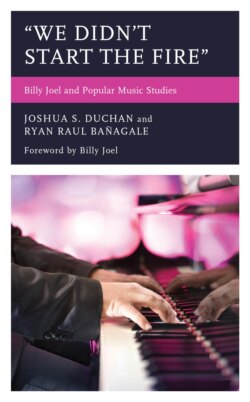Читать книгу “We Didn’t Start the Fire” - Группа авторов - Страница 20
На сайте Литреса книга снята с продажи.
CONCLUSION
ОглавлениеHistory has long been one of Joel’s passions, and it certainly shows on The Nylon Curtain.33 While the breakup of the Beatles in 1970 roughly coincides with the start of his solo career, by the time of the album’s release in 1982, things had changed profoundly. Popular music sounded different as rock ’n’ roll had given way, first to disco, then to new wave and easy listening. The social landscape looked different too. The economic boom following the end of the Second World War was replaced with recession, layoffs, and an oil embargo. And whereas the 1960s undoubtedly had its share of counterculture, the following decade brought the conflict in Vietnam into clearer focus, prompting, in many of Joel’s generation, an ever stronger desire to escape the existential threats of the present. If the Beatles’ music is the soundtrack of the 1960s, The Nylon Curtain stands as a retrospective on a more uncertain and dangerous world of the 1970s.
In his compositions, Joel clearly draws inspiration from a variety of sources, including Ray Charles and Phil Spector, singer-songwriters like Carole King, country and western musicians like the Eagles, and even Romantic-era classical composers such as Ludwig van Beethoven.34 The breadth of these influences evinces a deep engagement with the history of music. Yet it is also clear that he has long had a special relationship with the music of the Beatles, justifying concerted study of the two catalogs side-by-side. “You’re right to pick up on the Sgt. Pepper influence on The Nylon Curtain,” Joel said, agreeing upon the importance of the connection between the two:
And I’m the first to own up to it. I’ve been accused of being derivative. And I’m actually very open about it: of course I’m derivative, everybody’s derivative! [. . .] If I could pick who to be derivative of, I couldn’t think of a better band to be derivative of than the Beatles! [. . .] [The Nylon Curtain] in particular is probably the most derivative of all. But I’m proud of that because I think [the Beatles] were the best band that ever was. And if I could be anywhere near as good as them for a brief moment in time, I’ll own up to it.35
